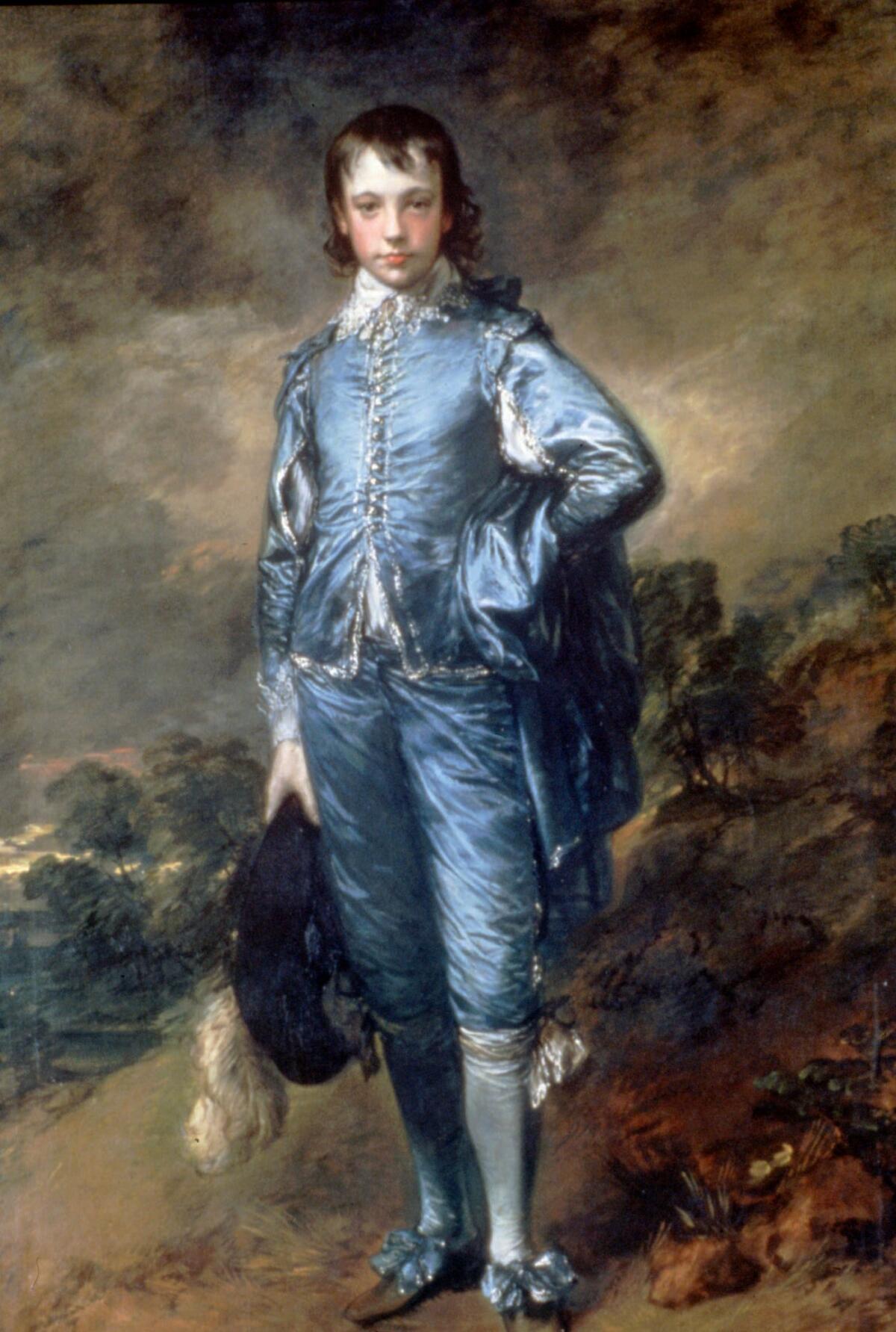Feedback: Let ‘The Blue Boy’ have his safe sojourn to London

- Share via
Regarding Christopher Knight’s commentary [“Why experts fear return of ‘The Blue Boy’ to London” [July 6]: In fact, experts don’t. Knight’s story is deeply one-sided and misleading.
After several years of considerable examination and discussion, and after instituting a rigorous set of protocols, the Huntington has decided to lend Thomas Gainsborough’s “The Blue Boy” to the National Gallery, London — but only upon expert advice and only under very specific, restrictive conditions. The long-term well-being of this iconic work has always been the Huntington’s guiding principle for any discussion about the possibility of a loan.
Knight’s piece failed to capture the degree to which we have studied the matter that eventually led us to this important decision. The 2018 panel of conservators he cites met to study the painting’s condition and to recommend a course of conservation treatment for it. They were not charged with advising on possible travel, but rather on the best plan of work to stabilize and respect the historic integrity of the work. We followed all of their recommendations regarding treatment.
In 2019 once most of the conservation work was complete, the Huntington convened a second panel of conservators and curators, specifically to advise us about possible travel. These were individuals from pre-eminent North American museums, all having similar collections and extensive experience with Old Master paintings. These professionals are all well-versed in best practices and the latest thinking around fine art transport for masterpieces of “The Blue Boy” caliber. The group was provided with the most up-to-date information about the painting’s condition and what had been learned over the course of the extensive conservation project. The panel advised that the painting could be lent safely, but that it should go to one venue only, an institution of the highest caliber with stellar exhibition and conservation facilities and staff and that it should be transported in a state-of-the art, custom-made crate. We are scrupulously following all the panel’s recommendations.
Thus, after exhaustive consideration, the Huntington has decided to loan our most iconic painting for this one occasion — the centennial of its departure from England, where it was last on display at the National Gallery — so that public and scholarly audiences across the Atlantic can view and study the painting post-restoration.
Great masterpieces have traveled from time to time, under very rigorous protocols. This one will as well. While we appreciate Knight’s abiding interest in the work, his piece was one of omission: he simply did not report the full set of facts, and this resulted in misleading and inaccurate conclusions.
Karen R. Lawrence
President
and
Gregory A. Pieschala
Chair of Board of Trustees
The Huntington Library, Art Museum, and Botanical Gardens
San Marino
::
Our Huntington Library membership is a true gem in our lifestyle. Normally, I support art exchanges between art organizations, but this one has me a little stumped.
“The Blue Boy” is a Gainsborough, and a striking example of his best work. I side with the conservators.
Make the Brits spend their pounds here.
Paintings are not sculptures or pottery, they’re fragile and subject to degradation on a different scale.
David Pohlod
Oak Park
Return to River City
Regarding “‘Music Man’ Revival Is Trouble With a Capital ‘T’” [July 8]: In her commentary Ashley Lee overlooks the fact that “The Music Man” was a subversive work about Wilson’s disappointment in how easily his hometown (Mason City, Iowa) was destroyed by con men from the larger cities. There are countless double entendre in the book about how ignorant he felt his hometown was.
He was not proud of Mason City, he left and never moved back.
Lee’s research seems to have ignored all of the important details that contextualize “The Music Man.” It’s a musical about a white man who rips off white people and then runs away. At no point is he celebrated. It’s a display of pageantry where ignorant people boast about being ignorant.
Quoting what other critics have written about the show as proof of intent is ridiculous when the author himself wrote an entire book and made an album about it so it would be clear to future generations what he was doing and how he did it.
It’s a musical that makes fun of white people for being so stupid. Perhaps Lee is confusing “The Music Man” with something that is representative of local culture and actually is a celebration of a sanitized version of America: Main Street U.S.A. in Disneyland.
Sam Pocker
Los Angeles
::
I believe most people go to the shows and movies primarily for entertainment and to escape from the often harsh reality. Thus it appears that your writer Ashley Lee seemed to have missed the point by seeing things through a looking glass tinted with political correctness.
Like many others, I have found the shows as well as the movie “The Music Man” uplifting and enjoyable with the tune of “76 Trombones” lingering in my head for days after.
The 2021 World Happiness Ranking placed America at the 19th place — near the bottom of all industrialized nations.
In my view, this is likely in part due to the yoke of political correctness placed on our shoulder making freedom of speech more of an illusion than a reality.
Can’t we just enjoy an event for what it is?
John T. Chiu
Newport Beach
Black Woodstock
Regarding “Undoing Black Erasure” [July 4]: Questlove’s film “Summer of Soul” is fine as a mostly political statement depicting Black angst and joy in late ‘60’s Harlem, framed by a gold mine of filmed live musical performances from the Harlem Cultural Festival, a series concerts heretofore unknown to many.
As a music historian, I expected Questlove’s film to feature mostly priceless musical performances never before seen with some cultural historical content for context. It was the opposite of that.
Therefore, please release a sequel containing full sets by B.B. King, Max Roach/Abbey Lincoln, Nina Simone, Stevie Wonder, Sly Stone, et al, and let real musical truth and joy shine through unabated.
Chris O’Connell
Westminster
The voice of TCM
I don’t know how anyone can talk about the importance of classic movie station TCM without mentioning the late, great Robert Osborne [“Classic Movies Fight Back,” July 4] .
Current hosts and the TCM audience owe so much to the modest, elegant Osborne. An actor (taught by Lucille Ball), a respected print and TV journalist and (I’m jealous!) someone who had long, almost weekly convos with the likes of Hedy Lamarr, Joan Fontaine and Olivia de Havilland.
His unique and sensitive interview with Betty Hutton brought tears to my eyes.
On-air TCM talent Mankiewicz, Stewart, Karger, Malone and Muller all ride atop those well-tailored and much-missed shoulders. To paraphrase what Cole Porter said about Irving Berlin’s place in American music, Robert Osborne was TCM, and classic Hollywood films.
Peter McDonald
Los Feliz
::
How is it possible that Stephen Battaglio could write a whole piece on how cord-cutting is affecting TCM and not mention Sling — the streaming service that carries TCM?
Not only can you watch in real time, but Sling recommends for viewing anytime other movies available on TCM that we may have missed during the regular broadcast time.
Michael Williams
Redondo Beach
Not an easy decision
Meredith Blake’s characterization of the Cosby decision as being based on a “technicality” fails to recognize what really occurred.
In a civil deposition Cosby sought to take the 5th Amendment. In order to obtain his testimony the then-DA agreed that there would be no criminal charges brought thereby forcing Cosby to testify since there was no criminal jeopardy resulting from it. The result was an award of more than $3 million to the plaintiff who had sued him. The new DA failed to honor the commitment of his predecessor, resulting in a trial and conviction. The Pennsylvania court corrected this injustice and overturned the conviction. It is not a technicality to demand that public officials honor and abide by agreements they make, even with the most unworthy of participants.
Barry Rubin
Beverly Hills
More to Read
The biggest entertainment stories
Get our big stories about Hollywood, film, television, music, arts, culture and more right in your inbox as soon as they publish.
You may occasionally receive promotional content from the Los Angeles Times.











